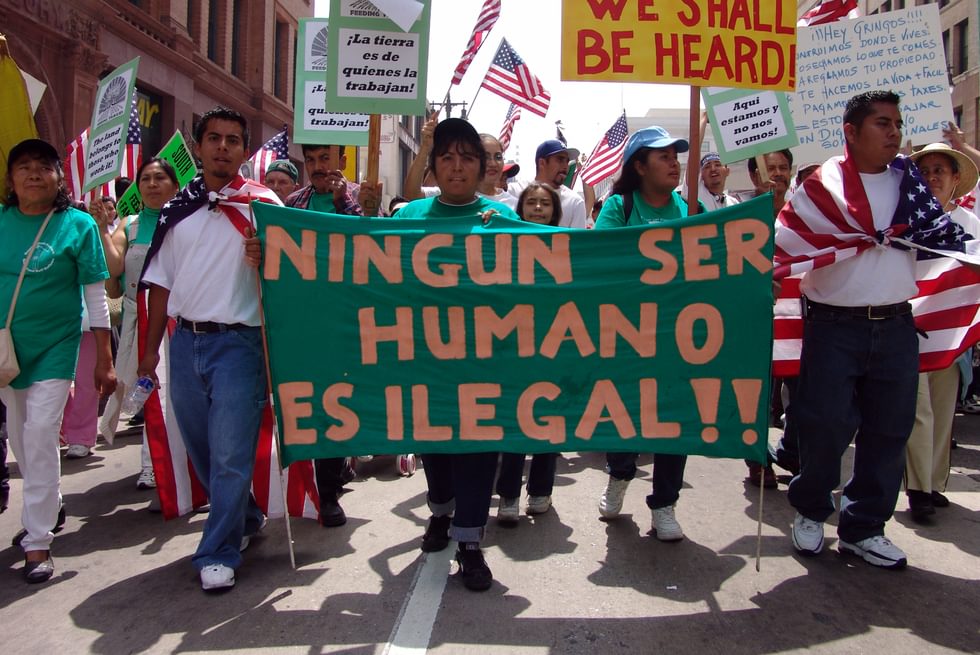Resources for Migrant Returnees in Mexico
From the Series: Im/migration in the Trump Era
From the Series: Im/migration in the Trump Era

I first interviewed Luis for a research project in the summer of 2008. We sat on folding chairs and talked for three hours in my Blue Island, Illinois backyard, pausing occasionally for the freight trains that rumbled noisily past. Almost exactly nine years later in 2017, I interviewed Luis again. This time, we talked on the roof of his sister’s house in León, Guanajuato, Mexico and caught up on life since his deportation the previous December.
When Luis was first deported, he hoped that his relationships with his U.S.-citizen partner and three U.S.-citizen children would compel the government to allow him to return to the United States legally. Now he knew better. He wasn’t sure what his future held, but for the time being he was trying to make ends meet in Mexico. As he watched television late one night, Luis saw an advertisement for a Mexican government program, Somos Mexicanos, that promised support for deportees like him. But when he called the number on the screen, the operator told him that he needed evidence of past employment to be eligible for job placement assistance. Luis had worked at a car wash in Chicago and, unable to secure a letter from his U.S. employer, found himself ineligible for assistance in Mexico.
The Somos Mexicanos program was implemented during the Obama administration in the United States, when Mexican authorities were scrambling to receive an influx of deportees. The deportation rate peaked at a historic high of more than 430,000 in 2013, and then declined somewhat as then-President Obama rolled back aggressive immigration enforcement programs. The 2016 electoral victory of Donald Trump, who campaigned on a platform of mass deportation, portends a return to record deportation rates. In response, Mexican agencies are preparing to receive even more deportees in need of assistance.
Yet as Luis’s story suggests, when deportees do interact with state agencies in Mexico, they often find themselves in need of documentation from their lives in the United States. Thus, even though Luis is now in his nation of citizenship, his eligibility for certain government services hinges on the ability to provide documents housed in the United States. In a context where migrants increasingly find their mobility impeded, their documents, it seems, must find ways to travel without them.
This kind of information brought me to León to see Luis in June 2017. I had been planning to conduct pilot research in Mexico with women from emigrant communities, but that plan felt less urgent following Trump’s victory. Five days after the election, I met with Sofia de la Peña Padilla from ITESO, the Jesuit University of Guadalajara, and my Loyola colleague, Maria Vidal de Haymes. We strategized about how best to respond to a Trump presidency, and Sofia suggested developing a project to help deportees reintegrate in Mexico. We agreed that impending attacks on immigrant communities compelled us to shift priorities away from scholarly knowledge production and toward developing practical responses to an urgent need. We decided to change our summer plans and to develop a project aimed at better understanding and responding to the challenges deportees face upon their return to Mexico.
My immediate goal for the project was to gather information for these Know Your Rights materials, which include information about return. Know Your Rights workshops for immigrant communities typically help people develop strategies to avoid apprehension by immigration authorities and to prepare them for the possibility of detention and deportation. By extending the Know Your Rights approach to include information about return for Mexican citizens, we hoped to provide information about preparations that people could make to facilitate their return, and to connect them with resources that are available to returnees upon arrival in Mexico.
Anthropologists are particularly well suited to collaborate with immigrant advocacy organizations on rapid assessments like the one we proposed. To gather materials and information, I went to Jalisco with two undergraduate students and in coordination with a group of Loyola social work graduate students. We made contacts with community organizers and officials who work with deported people, as well as returnees who have come back to Mexico after long stints in the United States. We spent three weeks conducting interviews, attending conferences and talks, and collecting materials to take back to the United States to share with immigrant communities.
We learned about the myriad challenges facing people who return. For example, parents who return are often separated from their U.S.-citizen children and can lose parental rights. Those who bring their U.S.-citizen children with them when they return encounter bureaucratic barriers to claiming dual citizenship for children, who may experience prolonged periods of exclusion from school and government services. For people who migrated to the United States without their families, return often means family reunification after a long estrangement, and couples grapple with divergent expectations about their roles as spouses, parents, and sexual partners. These experiences can provide useful information for migrants in the United States as they prepare for the possibility of a future in Mexico.
We also learned about government resources in Mexico such as the Somos Mexicanos program, as well as their many deficiencies. The information we collected—much of it prepared by organizations such as the Instituto para las Mujeres en la Migración—can help people manage challenges of return. Awareness of bureaucratic requirements, for example, can help migrants to proactively gather documentation before they leave and facilitate their registration with Mexican agencies. At a time of escalated policing in immigrant communities, we hope that this kind of information can ease fears of deportation and help people like my friend Luis to reincorporate in Mexican society.